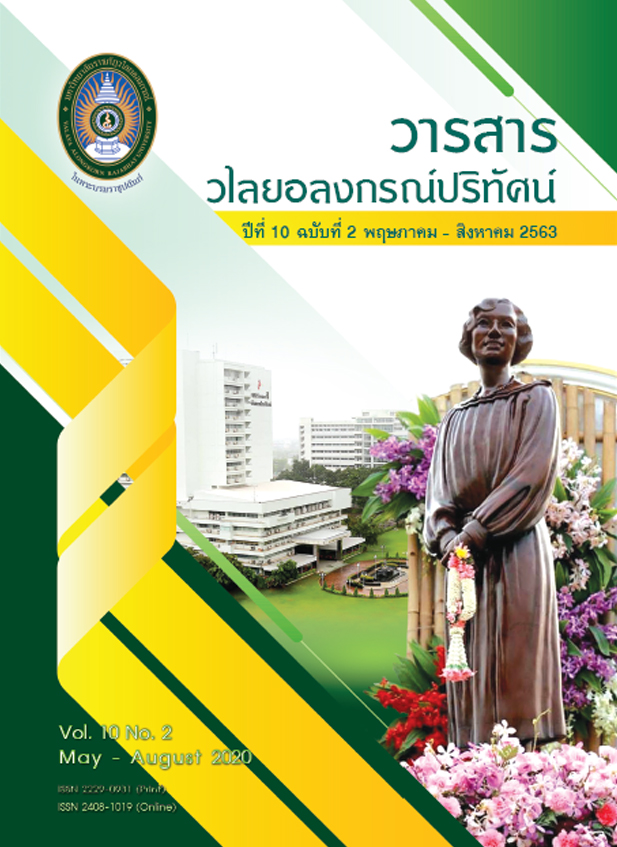ความสามารถในการอ่านและกลยุทธ์การอ่านภาษาอังกฤษออนไลน์ของนักศึกษาระดับปริญญาตรีที่เรียนรายวิชาภาษาอังกฤษ เพื่อพัฒนาทักษะการเรียน
คำสำคัญ:
กลยุทธ์การอ่านออนไลน์, การอ่านภาษาอังกฤษเพื่อความเข้าใจ, นักศึกษาระดับปริญญาตรีบทคัดย่อ
การศึกษานี้มีวัตถุประสงค์ 1) เพื่อศึกษาความสามารถในการอ่านภาษาอังกฤษเพื่อความเข้าใจของนักศึกษาระดับปริญญาตรี ที่เรียนรายวิชาภาษาอังกฤษเพื่อพัฒนาทักษะการเรียน และ 2) เพื่อศึกษาการใช้กลยุทธ์การอ่านภาษาอังกฤษออนไลน์ ของนักศึกษาระดับปริญญาตรีที่เรียนรายวิชาภาษาอังกฤษเพื่อพัฒนาทักษะการเรียน งานวิจัยนี้เป็นการศึกษาเชิงสำรวจ โดยเก็บข้อมูลจากกลุ่มตัวอย่างนักศึกษาระดับปริญญาตรี มหาวิทยาลัยราชภัฏวไลยอลงกรณ์ ในพระบรมราชูปถัมภ์ จังหวัดปทุมธานี จำนวน 153 คน เป็นนักศึกษาที่เรียนรายวิชาภาษาอังกฤษเพื่อพัฒนาทักษะการเรียน รหัสวิชา VGE104 ในภาคการศึกษาที่ 2 ปีการศึกษา 2562 เครื่องมือที่ใช้ในการเก็บข้อมูลเชิงปริมาณ คือ แบบทดสอบความสามารถในการอ่าน (Reading Comprehension Test) มีค่าความเชื่อมั่นของข้อสอบทั้งฉบับ 0.82 และแบบสอบถามการใช้กลยุทธ์อ่านภาษาอังกฤษออนไลน์ (Online Survey of Reading Strategies: OSORS) ที่มีค่าความเชื่อมั่นเท่ากับ 0.86 ส่วนการเก็บข้อมูลเชิงคุณภาพ ด้วยวิธีการสัมภาษณ์แบบกึ่งโครงสร้าง (Semi-Structured Interview) และการสังเกตการณ์แบบมีส่วนร่วม (Participant Observation) ข้อมูลที่เก็บรวบรวมนำวิเคราะห์เชิงปริมาณโดยใช้สถิติเชิงพรรณนา ได้แก่ การแจกแจงความถี่ ร้อยละ ค่าเฉลี่ย และส่วนเบี่ยงเบนมาตรฐาน ส่วนข้อมูลเชิงคุณภาพใช้เทคนิคการวิเคราะห์เนื้อหา (Content Analysis)
ผลการวิจัยพบว่า 1) นักศึกษามีความสามารถในการอ่านภาษาอังกฤษเพื่อความเข้าใจในระดับต่ำถึงระดับสูง โดยนักศึกษาส่วนใหญ่มีระดับความเข้าใจในการอ่านระดับปานกลาง ร้อยละ 53 และ 2) นักศึกษาใช้กลยุทธ์การอ่านภาษาอังกฤษออนไลน์ในระดับปานกลางถึงมาก โดยใช้กลยุทธ์การอ่านที่สนับสนุน (Support Strategies) เป็นอันดับแรก ในระดับมาก (ค่าเฉลี่ย 3.68) รองลงมาคือ กลยุทธ์การอ่านที่ใช้แก้ปัญหา (Problem Solving Strategies) ในระดับปานกลาง (ค่าเฉลี่ย 3.47) และกลยุทธ์การอ่านแบบองค์รวม (Global Reading Strategies) ในระดับปานกลาง (ค่าเฉลี่ย 3.29) ตามลำดับ การศึกษาครั้งนี้จะเป็นประโยชน์ต่อการออกแบบการเรียนการสอนภาษาอังกฤษออนไลน์เพื่อพัฒนาสมรรถนะการอ่านให้กับผู้เรียน จากผลการวิจัยจึงเสนอแนะว่า ควรให้ผู้เรียนได้ฝึกทักษะอ่านภาษาอังกฤษออนไลน์ควบคู่กับการสอนให้ผู้เรียนฝึกใช้กลยุทธ์การอ่านที่เหมาะสม และสร้างความตระหนักต่อการใช้กลยุทธ์การอ่านที่เน้นกระบวนการคิดเชิงอภิปัญญา (Metacognition) ซึ่งเป็นส่วนสำคัญยิ่งต่อการพัฒนาทักษะการอ่านและการประสบความสำเร็จในการเรียนรู้
เอกสารอ้างอิง
กัญญาณัฐ์ เตโชติอัศนีย์. (2562). ผลการจัดอันดับความสามารถในการใช้ภาษาอังกฤษ โดยดัชนี EF English Proficiency Index ปี 2019. [ออนไลน์], เข้าถึงได้จาก: https://thestandard.co/ef-english-proficiency-index-2019/ (2563, 8 เมษายน).
เบญจมาศ ศิริกมลเสถียร และคณะ. (2560). อภิปัญญากับการพัฒนาสมรรถนะการอ่านภาษาอังกฤษในระดับอุดมศึกษา. วารสารวิจัยทางวิทยาศาสตร์สุขภาพ. 11(1), 90-98.
สรวงมณฑ์ สิทธิสมาน. (2562). การอ่านกับสิ่งที่หายไปในโลกดิจิทัล. [ออนไลน์], เข้าถึงได้จาก: http://mgronline.com/qol/detail/9620000032885 (2563, 8 เมษายน).
สำนักงานพัฒนาธุรกรรมทางอิเล็กทรอนิกส์. (2561). รายงานผลการสำรวจพฤติกรรมผู้ใช้อินเทอร์เน็ตในประเทศไทยปี 2561. [ออนไลน์], เข้าถึงได้จาก: http://www.etda.or.th/publishing-detail/thailand-internet-user-profile-2018.html (2563, 15 เมษายน).
Anderson, N. J. (1999). Exploring Second Language Reading: Issues and Strategies. Heinle & Heinle Publishers.
Anderson, N. J. (2003). Scrolling, Clicking, and Reading English: Online Reading Strategies in a Second/Foreign Language. The Reading Matrix. 3(3), 1-33.
Barrett, T.C. (1972). Taxonomy of Reading Comprehension: Reading 360 Monograph. Lexington, MA: Ginn and Co.
Brown, H. D. (2007). Principles of Language Learning and Teaching. New Jersey: Prentice Hall Regents.
Burns, P. et al. (1984). Teaching Reading in Today’s Elementary School 3rd. New York: Houghton. Miffin.
Cogmen, S. & Saracaloglu, S. (2009). Students’ Usage of Reading Strategies in the Faculty of Education. Procedia: Social and Behaviroral Sciences. 1(1), 248-251.
Coiro, J. (2003). Reading Comprehension on the Internet: Expanding our Understanding of Reading Comprehension to Encompass New Literacies. The Reading Teacher. 56(5), 458-464.
Coiro, J. & Dobler, E. (2007). Reading Comprehension on the Internet: Exploring the Online Comprehension Strategies Used by Sixth-Grade Skilled Readers to Search for and Locate Information on the Internet. Reading Research Quarterly. 42(2), 214-257.
Hammerberg, D. (2004). Comprehension Instruction for Socioculturally Diverse Classrooms: A Review of What We Know. The Reading Teacher. 57(7), 648-658.
Harmer, J. (2006). The Practice of English Language Teaching. Harlow: Longman.
Kletzien, S. (1991). Strategy Use by Good and Poor Comprehenders Reading Expository Text of Differing Levels. Reading Research Quarterly. 26(1), 67-86.
Mokhtari, K. & Sheorey, R. (2002). Measuring ESL Students’ Awareness of Reading Strategies. Journal of Development Education. 25(3), 2-11.
Singh, R. & Shaari, A. (2019). The Analysis of High-Order Thinking Skills in English Reading Comprehension Tests in Malaysia. Malaysian Journal of Society and Space. 15(1), 12-26.
Sheorey, R. & Mokhatari, K. (2001). Differences in the Metacognitive Awareness of Reading Strategies among Native and Non-Native Readers. System. 29(4), 431-449.
Smith, F. (2004). Understanding Reading. (6th ed.). Mahwah, NJ: Lawrence Erlbaum.
Villamin, M. A. (1994). Innovative Strategies in Communication Arts. Quezon City, Philippines: Phoenix Publishing House.
Yuksel, I. & Yuksel, I. (2012). Metacognitive Awareness of Academic Reading Strategies. Procedia: Social and Behavioral Sciences. 31, 894-898.
ดาวน์โหลด
เผยแพร่แล้ว
รูปแบบการอ้างอิง
ฉบับ
ประเภทบทความ
สัญญาอนุญาต
ข้อความที่ปรากฏในบทความแต่ละเรื่องในวารสารวไลยอลงกรณ์ปริทัศน์ เป็นความคิดเห็นของผู้นิพนธ์แต่ละท่าน มิใช่เป็นทัศนะและมิใช่ความรับผิดชอบของกองบรรณาธิการจัดทำวารสาร และ
มหาวิทยาลัยราชภัฏวไลยอลงกรณ์ ในพระบรมราชูปถัมภ์


